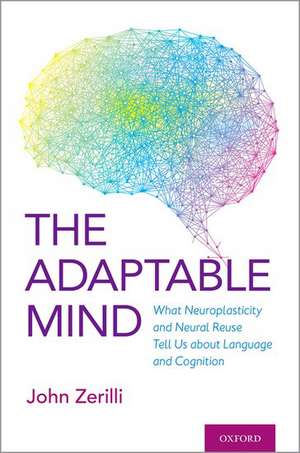The Adaptable Mind: What Neuroplasticity and Neural Reuse Tell Us about Language and Cognition
Autor John Zerillien Limba Engleză Hardback – 11 ian 2021
Preț: 300.14 lei
Preț vechi: 332.14 lei
-10% Nou
Puncte Express: 450
Preț estimativ în valută:
57.43€ • 60.12$ • 47.52£
57.43€ • 60.12$ • 47.52£
Carte disponibilă
Livrare economică 05-11 martie
Preluare comenzi: 021 569.72.76
Specificații
ISBN-13: 9780190067885
ISBN-10: 0190067888
Pagini: 192
Dimensiuni: 236 x 155 x 15 mm
Greutate: 0.45 kg
Editura: Oxford University Press
Colecția OUP USA
Locul publicării:New York, United States
ISBN-10: 0190067888
Pagini: 192
Dimensiuni: 236 x 155 x 15 mm
Greutate: 0.45 kg
Editura: Oxford University Press
Colecția OUP USA
Locul publicării:New York, United States
Recenzii
Zerilli (Univ. of Oxford) provides a pithy, readable account of salience and neural reuse in modeling cognitive activities related to language ... a useful introduction to the neural reuse literature. Recommended. Graduate students, faculty, and professionals.
The prose is clear, succinct and lively. In many places it tips over into elegance. Indeed the exposition is so clear that, although I'm a cognitive scientist rather than a philosopher, I learned a good deal from reading it. Zerilli is equally at home with neural and behavioural data, and well-informed about the history of neuroscience. Overall, this book provides a clear, rigorous, well-informed examination of how we should conceive of modularity in the light of recent evidence of neural reuse. Many of the lines of argument are original and likely to make a valuable contribution to enquiry about modularity in general, and the modularity of language in particular."
The book provides a thoroughly researched and well-written review of the literature on brain modularity. It lays out the various possible positions in the debate, and the sorts of evidence that might push proponents into one or another of the locations in the landscape of ideas, with admirable clarity. It is beautifully executed and will prove to be an extremely useful guide to anyone in the field, but especially, I think, for younger scholars looking for a way into the debate. I will certainly be assigning it in my graduate seminars."
One of the most outstanding features of this book is the quality and clarity of its argument, especially concerning the number of fields and complex subjects it ranges across-from neuropsychology, to linguistics and cognitive neuroscience. This is a complex and technical field, but Zerilli's control of the concepts and evidence is masterful."
The prose is clear, succinct and lively. In many places it tips over into elegance. Indeed the exposition is so clear that, although I'm a cognitive scientist rather than a philosopher, I learned a good deal from reading it. Zerilli is equally at home with neural and behavioural data, and well-informed about the history of neuroscience. Overall, this book provides a clear, rigorous, well-informed examination of how we should conceive of modularity in the light of recent evidence of neural reuse. Many of the lines of argument are original and likely to make a valuable contribution to enquiry about modularity in general, and the modularity of language in particular."
The book provides a thoroughly researched and well-written review of the literature on brain modularity. It lays out the various possible positions in the debate, and the sorts of evidence that might push proponents into one or another of the locations in the landscape of ideas, with admirable clarity. It is beautifully executed and will prove to be an extremely useful guide to anyone in the field, but especially, I think, for younger scholars looking for a way into the debate. I will certainly be assigning it in my graduate seminars."
One of the most outstanding features of this book is the quality and clarity of its argument, especially concerning the number of fields and complex subjects it ranges across-from neuropsychology, to linguistics and cognitive neuroscience. This is a complex and technical field, but Zerilli's control of the concepts and evidence is masterful."
Notă biografică
John Zerilli is a philosopher with particular interests in cognitive science, artificial intelligence, and the law. He is currently a Research Fellow at the Leverhulme Centre for the Future of Intelligence, in the University of Cambridge, and from 2021 will be a Leverhulme Trust Fellow at the University of Oxford.
